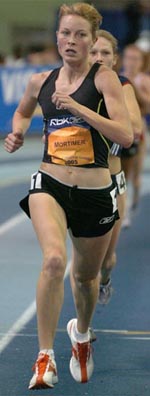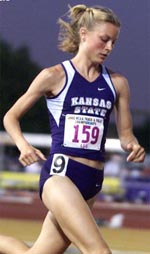|
Interview
with Amy Mortimer
by Becky
Wexler
 |
|
Amy
Mortimer runs the 3,000 at the 2005 Reebok Boston Indoor Games.
(Both photos by Alison Wade/New York Road Runners)
|
 |
|
Mortimer
runs the 1,500 for Kansas State at the 2002 NCAA Track & Field
Championships.
(Photo by Alison Wade/New York Road Runners)
|
Since
graduating from Kansas State University in 2003, Amy Mortimer has transitioned
from collegiate star to successful professional distance runner. A 12-time
All-American at Kansas State, Mortimer set personal bests of 4:12 for
1,500 meters and 15:44 for 5,000 meters. At the 2004 U.S. Olympic Trials,
she finished ninth in a highly competitive 1,500, running a then-personal
best of 4:11.51. This June, Mortimer has finished third at the 2005 USA
Outdoor Track & Field Championships 1,500 meters in 4:07.58, a personal
best, but just shy of the IAAF World Championships "A" standard
needed to secure a spot on the starting line in Helsinki.
Although
primarily a track runner, Mortimer has also achieved success on the trails
and the roads since turning professional. In February, she was part of
the the bronze medal winning U.S. team at the IAAF World Cross Country
Championships in Saint Galmier, France. The weekend after she returned
from France, Mortimer flew to New York to compete in the USA 8K Championships
on Randall's Island, where she finished ninth.
On September
24, Mortimer will return to New York for the Continental Airlines Fifth
Avenue Mile. Although the mile is her baby, Mortimer has rarely been tested
on the roads at the distance. We caught up with Mortimer in Boston —
where she's now training, coaching, and attending graduate school at Boston
College — to talk about her upcoming trip to New York City, her assistant
coaching job at BC, her summer of racing, and more.
Fast-Women.com:
After growing up and going to school in Kansas, how have things changed
for you since you made the move to Boston?
Amy Mortimer:
It's been a big change, but it's been nice to have the guys [on the team]
at Boston College to train with. I like having at least a little bit of
a team atmosphere rather than training completely on my own. I also signed
with Reebok and I've gotten to know some of the other people who run for
them as well since I've been here. A bunch of us had a photo shoot in
January in L.A. for some [Reebok] ads, and they also organize dinners
for us at meets.
FW:
You also have a new coach now in John Mortimer, right?
AM:
Yeah, and we're not married or related, like everyone thinks at first.
[Laughs.] It was a bit of an adjustment at first, especially since John
is busy with his BC coaching duties too. I work out with the team sometimes,
but my workouts are individualized. But John ran a lot of my workouts
with me last year, which was nice.
FW: Do you
like being in a coaching role?
AM:
I like what I'm doing now, but I'm not sure coaching would be the best
fit for me over the long term. And then there's the fact that last year,
I was driving the van to the airport to pick up some recruits and I ran
out of gas for the first time ever. It was awful.
FW: Have
you recruited anyone for the BC team?
AM:
Yeah, I recruited one girl from Kansas last year who came, and then another
girl from Kansas is walking on to the team, too. Our head coach told me
I could retire from coaching now batting 1000. It was neat; I'm kind of
excited about it.
FW: How
does the BC women's team look this year for cross country?
AM:
I think we're going to be really good. We had a really good recruiting
class, and Maria Cicero has one more season. We got Nichole Lister, a
Foot Locker finalist [from New York]; a couple of Canadian girls…
We just have a lot of girls coming in, it's hard to keep them all straight!
The men's team is big too — when I work out with the guys, I run with like
40 of them. I'm always calling them by the wrong names.
FW:
How do they feel about working out with you?
AM:
The first couple of weeks were kind of hard. I'm not sure if it was because
they were all used to each other and not me, but they kept trying to hammer
on all of our runs, especially long runs. Finally, one day on a long run
— I think it was a 10-smiler — I hammered back at them and earned
their respect.
FW: How
many miles a week are you running now?
AM: About 50-65 miles per week. My mileage isn't too high compared to
some other runners, but it works for me.
FW:
Do you take a day off from training each week?
AM:
Yes, I have to. I like to emphasize quality rather than quantity. I've
found that if I don't get my day off one week, I pay for it the next week.
I also try to get a lot of sleep — I try to get about nine hours
each night.
FW: Do you
still see yourself primarily as a miler and a 1,500-meter runner?
AM:
Right now I do. I love the 1,500; it's my favorite. But there are things
I really like about the 5K, too. I trained like a 5K runner this year
and did some longer races and then I started running faster in the 1,500.
So we decided to enter the 1,500 at [the USA Outdoor Track & Field
Championships].
FW:
The final of the 1,500 meters at the USA Outdoor Track & Field Championships
was pretty competitive. Did you feel like you had a chance to win it?
AM:
I didn't have a hard and fast time goal or anything, but I had a really
good feeling going into the race. I was really excited with my place.
FW: You
had some pretty good races leading up to that one, right?
AM: Yeah, my spring season was weird, because I'd have one race that was
really good and then the next one would be really awful. A lot of times
something would happen, like I'd get sick or the weather would be horrible.
Or it might have been overtraining.
I just took
my two-week break; the first week, I didn't run at all and then the second
week, I started back up slowly, like 20- or 30-minute runs a couple of
days a week. I was home after being in Europe all that time and I was
exhausted. I stayed active, but there were a couple of days there when
I just sat on the couch.
FW: After
your third-place finish at U.S. nationals, you went on to chase the IAAF
World Championships "A" standard in Europe. How was your experience
there?
AM:
It was really stressful. I'm not used to traveling around by myself that
much. Sometimes I traveled with the other girls, but our schedules were
all different. There were people I knew at every meet I went to, but it
was more flying around by myself that I didn't really like. Everything
was new, so it was overwhelming.
FW: How
did the races turn out?
AM:
I did five races while I was in Europe. My race in Croatia was the best;
I ran 4:08.77 there, and that was only my second time under 4:10. It proved
to me that my time at [the USA Outdoor Track & Field Championships]
wasn't a fluke; I was like, 'I can really do this!' But unfortunately
it just wasn't a good summer for American women to get the "A"
standard.
FW: Since
there were a handful of you chasing down spots on the World Champs team,
was it a competitive atmosphere among the Americans, or was it more like
everyone working together?
AM: It was both. I was kind of worried going over there because I felt
like I had to defend my [third place] spot a little bit.
FW: Switching
gears slightly, have you finished your graduate program, or are you still
taking classes?
AM:
I was supposed to finish in July, but after nationals I decided to go
to Europe to chase the "A" standard [for the 1,500 meters.]
The class I need is only offered in the summer, so I won't have class
again until June. I'll be finished after that. My Master's will be in
accounting.
FW: Boston
had a pretty snowy winter last year. How did you find training through
that?
AM:
Well, we have some pretty bad winters in Kansas, so I was thinking, 'Oh,
it can't be that bad.' But it was really unrelenting — five months
of really cold weather. In Kansas, we usually get a break for one or two
weeks and the temperatures will be like 50 or 60 degrees. Not here. My
mom came to visit me in May, and it was raining and 40 degrees. So I did
a lot of long runs on the football field at BC, because they have a bubble
over it in the winter. I hate running on a treadmill, so I'd rather run
laps. I did try to run outside, but I worry about my asthma. I try not
to irritate my throat too much. And I just don't like being cold.
FW: Do you
see yourself staying in Boston for a while?
AM:
We'll see. I was so close to home before that it's still hard for me to
be out here. I'm learning to be more independent. It's hard to be away
from my parents, especially since they've been so supportive of my running,
and school, and everything else. It was really hard last fall, because
I'm so used to having them at all my races. I'd finish a road race and
have to ride the T home. I know it's good that I'm growing up, but I'm
not sure if I want to grow up yet.
FW: Are
you excited about the upcoming Continental Airlines Fifth Avenue Mile?
Have you raced in New York City much?
AM:
I did the 8K [National Championships] in March and I've run Millrose and
some other indoor meets at the Armory. I did the New Balance Games there
and got stuck in New York for an extra day or two because of the big snowstorm.
It was fun because one of my friends, [former University of Colorado runner]
Lesley Higgins, lives there so we always go running together in Central
Park. I've never done the Fifth Avenue Mile before, though. New York Road
Runners treated us really well for the 8K, so I'm sure it will be similar.
FW:
Have you done other road miles before?
AM:
I did the Pennsylvania Avenue Mile in Washington, D.C., last fall. [Editor's
note: Mortimer came in second to fellow Continental Airlines Fifth Avenue
Mile competitor Carmen Douma-Hussar there.] I really liked it. We went
out pretty fast, in like 2:13, and then 2:26 coming back but I was chasing
people down. That's the thing about road racing — you can totally
fall off the pace but still place well.
(Interview
conducted August 31, 2005, and posted September 20, 2005.)
Nothing
contained herein may be reproduced online in any form without the
express written permission of the New
York Road Runners Club, Inc.
|
|



